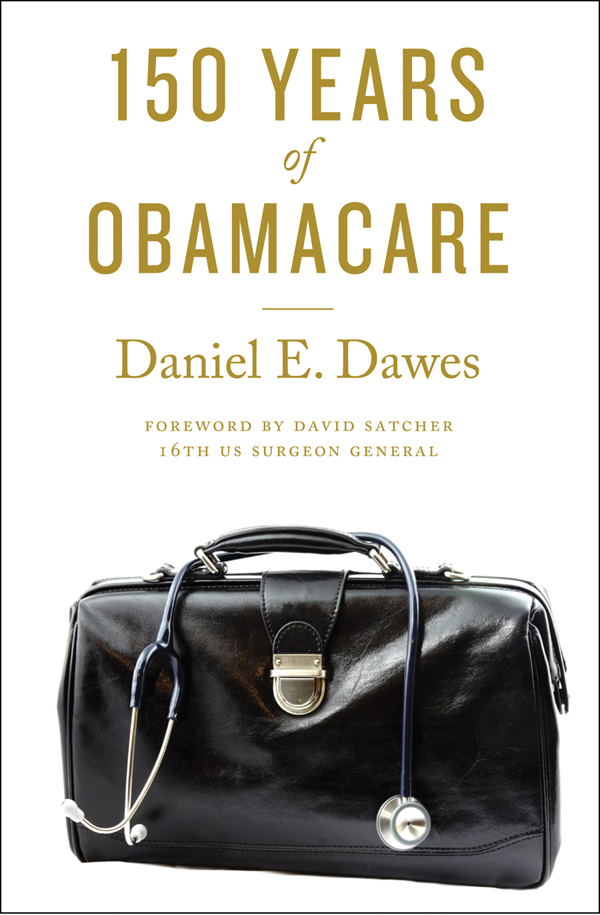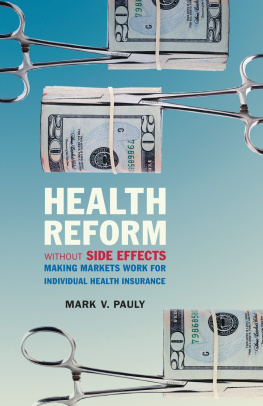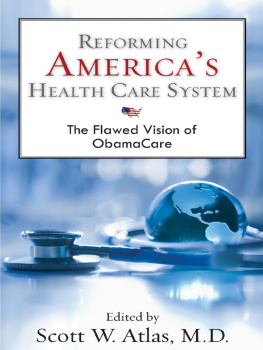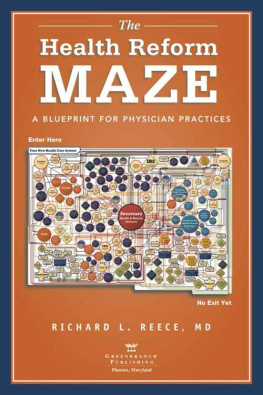Dawes - 150 Years of ObamaCare
Here you can read online Dawes - 150 Years of ObamaCare full text of the book (entire story) in english for free. Download pdf and epub, get meaning, cover and reviews about this ebook. City: United States, year: 2016, publisher: Johns Hopkins University Press, genre: Politics. Description of the work, (preface) as well as reviews are available. Best literature library LitArk.com created for fans of good reading and offers a wide selection of genres:
Romance novel
Science fiction
Adventure
Detective
Science
History
Home and family
Prose
Art
Politics
Computer
Non-fiction
Religion
Business
Children
Humor
Choose a favorite category and find really read worthwhile books. Enjoy immersion in the world of imagination, feel the emotions of the characters or learn something new for yourself, make an fascinating discovery.

150 Years of ObamaCare: summary, description and annotation
We offer to read an annotation, description, summary or preface (depends on what the author of the book "150 Years of ObamaCare" wrote himself). If you haven't found the necessary information about the book — write in the comments, we will try to find it.
Dawes: author's other books
Who wrote 150 Years of ObamaCare? Find out the surname, the name of the author of the book and a list of all author's works by series.
150 Years of ObamaCare — read online for free the complete book (whole text) full work
Below is the text of the book, divided by pages. System saving the place of the last page read, allows you to conveniently read the book "150 Years of ObamaCare" online for free, without having to search again every time where you left off. Put a bookmark, and you can go to the page where you finished reading at any time.
Font size:
Interval:
Bookmark:

150 Years of ObamaCare
150 Years
of ObamaCare
Daniel E. Dawes
Foreword by David Satcher, MD, PhD, 16th US Surgeon General
Johns Hopkins University Press / Baltimore
2016 Johns Hopkins University Press
All rights reserved. Published 2016
Printed in the United States of America on acid-free paper
9 8 7 6 5 4 3 2 1
Johns Hopkins University Press
2715 North Charles Street
Baltimore, Maryland 21218-4363
www.press.jhu.edu
Library of Congress Cataloging-in-Publication Data
Dawes, Daniel E., 1980, author.
150 years of ObamaCare / Daniel E. Dawes ; foreword by David Satcher.
p. ; cm.
One hundred fifty years of ObamaCare
Includes bibliographical references and index.
ISBN 978-1-4214-1963-3 (hardcover : alk. paper) ISBN 1-4214-1963-7 (hardcover : alk. paper) ISBN 978-1-4214-1964-0 (electronic) ISBN 1-4214-1964-5 (electronic)
I. Title. II. Title: One hundred fifty years of ObamaCare.
[DNLM: 1. United States. Patient Protection and Affordable Care Act. 2. Health Care ReformtrendsUnited States. 3. Health Care ReformhistoryUnited States. 4. History, 21st CenturyUnited States. 5. Insurance, HealthhistoryUnited States. 6. Insurance, HealthtrendsUnited States. WA 540.AA1]
RA395.A3
362.1'04250973dc23 2015028201
A catalog record for this book is available from the British Library.
Special discounts are available for bulk purchases of this book. For more information, please contact Special Sales at 410-516-6936 or specialsales@press.jhu.edu.
Johns Hopkins University Press uses environmentally friendly book materials, including recycled text paper that is composed of at least 30 percent post-consumer waste, whenever possible.
To all health equity champions, past, present, and future
Contents
Foreword
So let us begin anewremembering on both sides that civility is not a sign of weakness, and sincerity is always subject to proof. Let us never negotiate out of fear. But let us never fear to negotiate. Let both sides explore what problems unite us instead of belaboring those problems which divide us. In your hands, my fellow citizens, more than mine, will rest the final success or failure of our course. President John F. Kennedy, inaugural address given January 20, 1961
Few people would probably disagree that the health reform debate has been exceptionally contentious and polarizing. The extreme partisan bickering has spilled over into mainstream conversations, causing widespread confusion and angst among communities across the country. Some argue that this debate, as profound and necessary as it is, cannot be reconciled. They point to the intensity of the struggle to pass the law and now the unyielding assault on the law as it is being implemented.
Today, we are at an inflection point, with many of the health reforms either already implemented or almost implemented. However, with unwavering opposition to the Affordable Care Act (ACA) and attempts to dismantle the very core of this law, is it even possible to overcome this acrimonious debate and objectively examine what is working and what could be changed to ensure that all Americans have access to affordable patient-centered care, appropriate treatments, and preventive services? Indeed, the ACA is a comprehensive and complex law, which has taken generations to finally produce. Its rich history of advocacy, negotiations, and ultimate evolution certainly merits our thoughtful attention in order to understand what the law entails, how it goes about accomplishing its objectives, and the impact it has had to date.
Perhaps in such a time as this, with emotions at an all-time high in favor or against the health reform law, it would be prudent to heed President Kennedys admonition to stop belaboring those problems that divide us and instead explore what problems unite us, because the success of this laws implementation is in our hands. We have the power to ensure not only that this law is implemented but that it is implemented in a manner that will have the most positive impact on communities across the nation.
I encountered a major challenge with our health system early in my life. At the age of two, I suffered a severe and life-threatening illness while growing up on a farm outside of Anniston, Alabama. A combination of race and poverty virtually shut my family and others out of the health care system. Fortunately, the one black physician in the area, Dr. Fred Jackson, agreed to come out to the farm on his day off to see me. He doubted that I would survive but instructed my parents on how to give me the best chance of survival. I did survive, but I never met Dr. Jackson after that encounter because he died of a stroke that same year. He was fifty-four years of age. But, out of that encounter, I developed a desire to be a physician and a passion to make health care better for everyonea passion that has characterized my career to this day.
Through public service and leadership roles as the former director of the Centers for Disease Control and Prevention, US assistant secretary of Health and Human Services, and 16th US surgeon general, I saw the full scope of the impact that our fragmented health care system, with its lack of attention to population health, was having on our nation. During my tenure in public service, I gained firsthand experience in some of the intricacies involved with repairing a broken health care system. As surgeon general I continued the battle against smoking and worked tirelessly to address pressing public health issues, including obesity, oral health, mental and behavioral health, sexual health, and violence. We conducted large-scale studies to examine these particular issues and institute appropriate public policies and strategies to effect positive changes.
As a result of rigorous scientific investigations, we were able to produce landmark reports, including Mental Health: A Report of the Surgeon General (1999), Oral Health in America: A Report of the Surgeon General (2000), and The Surgeon Generals Call to Action to Promote Sexual Health (2001), highlighting issues that were critical to improving health outcomes across the nation but long neglected because people were fearful of discussing them. These reports as well as other studies helped to inform proposed and existing health policies such as the Mental Health Parity and Addiction Equity Act, the Ryan White CARE Act, and the Child Healthcare Crisis Relief Act. However, I am most proud that these studies played a role in informing and shaping the historic health reform law that was enacted on March 23, 2010. Today we stand firmly at the threshold of a historically momentous opportunity to delineate a national agenda to promote health and health care for all Americans. The enactment of the Affordable Care Act represents both a culmination of enduring legislative and health policy efforts and a reinvigorated infrastructure that expands access to one of the most essential and basic human rightshealth. It is the first major law that comprehensively addresses the complexities inherent in our health care system, including its multidimensional workforce, delivery of care, health equity, prevention, and public health issues that are important for diverse populations. Because of the ACA, I am optimistic that we will make significant strides in improving the health of individuals, families, and communities in our nation.
An Institute of Medicine book, US Health in International Perspective: Shorter Lives, Poorer Health (2013), documented the alarming implications of the poor health status of our population. This landmark report helps to explicate from a global perspective comparisons among seventeen peer countries of life expectancy, selected medical conditions, and health outcomes, particularly infant mortality and low birth weight, injuries and homicides, disability, adolescent pregnancy and sexually transmitted infections, HIV and AIDS, drug-related deaths, obesity and diabetes, heart disease, and chronic lung disease. One notable finding was that individuals who are most negatively impacted, suffer the greatest, and are at highest risk for deleterious outcomes are people of lower socioeconomic status who live in underserved, vulnerable, and impoverished communities. These harsh realities certainly warrant further examination and reinforce the need to implement the reforms embodied in the Affordable Care Act so that America can stand unchallenged as a leader in the quest for global health equity.
Font size:
Interval:
Bookmark:
Similar books «150 Years of ObamaCare»
Look at similar books to 150 Years of ObamaCare. We have selected literature similar in name and meaning in the hope of providing readers with more options to find new, interesting, not yet read works.
Discussion, reviews of the book 150 Years of ObamaCare and just readers' own opinions. Leave your comments, write what you think about the work, its meaning or the main characters. Specify what exactly you liked and what you didn't like, and why you think so.








